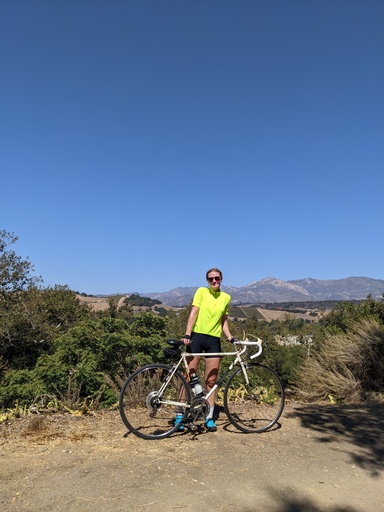
Hometown: Oskaloosa, Iowa
Undergraduate Degree: University of Iowa
Matched: Family Medicine, Kaiser Permanente (San Diego)
As Claire Carmichael watched her mom work as a veterinarian in Oskaloosa, Iowa, she realized she wanted to serve her community in a similar way.
"I joke that I come from a line of veterinarians, but I am the first ‘people doctor’ in my family,” says Carmichael, a graduating medical student.
Though the patients look very different, Carmichael says that in a rural town like Oskaloosa, the position that a vet has in the community is like that of a family doctor in some ways.
"I see a lot of overlap,” she says. “I think the challenges are pretty similar—finding work-life balance, working with limited resources, the time commitment of putting your patients first.”
But she also saw the rewards, and they made the job seem well worth it.
“From what I’ve seen of her career, you get a lot more out of it when you personally know the people, you’re taking care of,” Carmichael says. “It makes it a much more fulfilling career.”
Medicina y español
Carmichael attended the University of Iowa to earn a bachelor’s degree in genetics and biotechnology and a Spanish minor. She took a medical Spanish class during which she volunteered with the Iowa City Free Medical and Dental Clinic, assisting Spanish-speaking patients as they navigated their care.
"Such a big part of family medicine is getting to know people for their stories,” she says. “People are so much more than their diagnosis. When you can learn more about who they are as a person and what struggles they have socioeconomically, or in their career or family, I think you get a much better idea of what will equal a better state of health for them.”
She matched in family medicine at Kaiser Permanente in San Diego, and she is looking forward to putting her Spanish skills to good use serving a patient population close to the U.S.-Mexico border.
“Having grown up in Iowa and gone to Iowa for undergrad and med school, I think there are a lot of advantages to training in a different part of the country,” she says.
The program’s emphasis on building opportunities for community outreach into the family medicine training schedule appealed to her.
“Community engagement is something that I've really liked during my time at Iowa,” she says. “As a resident you’re so busy, so finding a place where I can still make time to do that was important to me.”
Serving rural Iowans
Alongside studying, serving as co-president of the Family Medicine Interest Group, and volunteering with Big Brothers Big Sisters, Carmichael participated in the Carver Rural Iowa Scholars Program (CRISP). The program offers student loan forgiveness to four students from each first-year medical class who commit to training in a primary care field (internal medicine, general surgery, family medicine, pediatrics, psychiatry, or obstetrics and gynecology) and serving in a small Iowa community after residency training. The goal is to help address the shortage of physicians in rural Iowa.
Apart from the financial incentive, the students in the CRISP cohort benefit from additional exposure to rural-focused job shadowing and research opportunities, mentorships, seminars, and elective coursework.
“CRISP was part of the reason that I wanted to go to Iowa for medical school,” Carmichael says. “It's been really fun having a built-in friend group with the other students. I've gotten really close to them.”
Job shadowing family physicians in Oskaloosa and Boone cemented her interest in becoming a family medicine physician in a small town.
“I went to the Boone County Hospital with one of my best friends here, Anna Wilcox. We lived in a tiny on-call room together,” she remembers. "We would walk out in the morning to go brush our teeth in the bathroom across the hall and patients would be coming in, and we were like, ‘Oh, good morning!’
“I think that's a really important part of the program. They offer this opportunity between your first and second year to get a better idea of what rural medicine can really look like.”
CRISP also requires that students complete a capstone project. Carmichael is working on a literature review about group antenatal care, an emerging model of care sometimes referred to as “centering pregnancy.” In this model, pregnant patients are placed in groups by approximate gestational age to undergo prenatal appointments and education together.
"I think it's a really nice model because it encourages a lot of social support," she says. “My capstone is looking at examples of this model in lower-resourced environments and seeing what the benefits and limitations are for group antenatal care in rural communities.”
She also explored her interest in obstetrics and gynecology by helping lead Maternal Observation for Medical Students, a group that pairs students with expecting parents at UI Hospitals & Clinics so they can follow them through pregnancy. She hopes to integrate obstetrical care into her family medicine practice one day.
Her relationship with mentor Jeffrey Hoffman, DO, of Guttenberg, Iowa, has also contributed to her interest in practicing family medicine in Iowa. She says her rotation in Guttenberg helped her “get the full spectrum of family medicine experience,” not only in the clinical setting, but also behind the scenes.
“I lived with him and his wife, Carolyn. They felt like a second home to me during medical school,” she says. “It’s important to have professional mentors, but also people who are personal mentors because they understand what it's like to go through med school, residency, and moving to a small town.”
After residency training, she plans to move with her partner, also from Oskaloosa, back near her hometown to practice family medicine.
“I would love to be at a smaller, critical-access hospital, like where I've done a lot of my rotations,” she says. “It offers the lifestyle and the scope of practice that I see for myself long-term.”